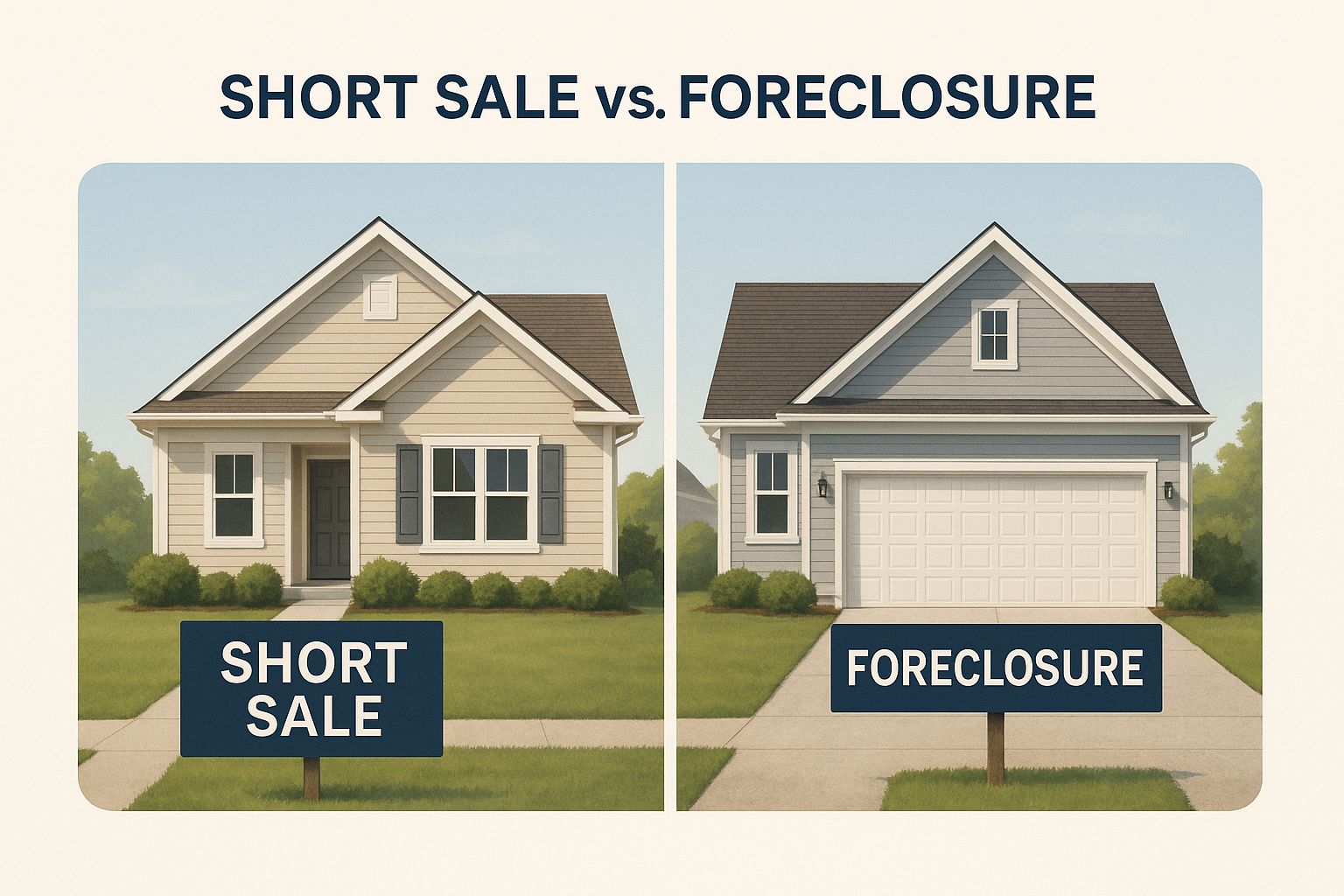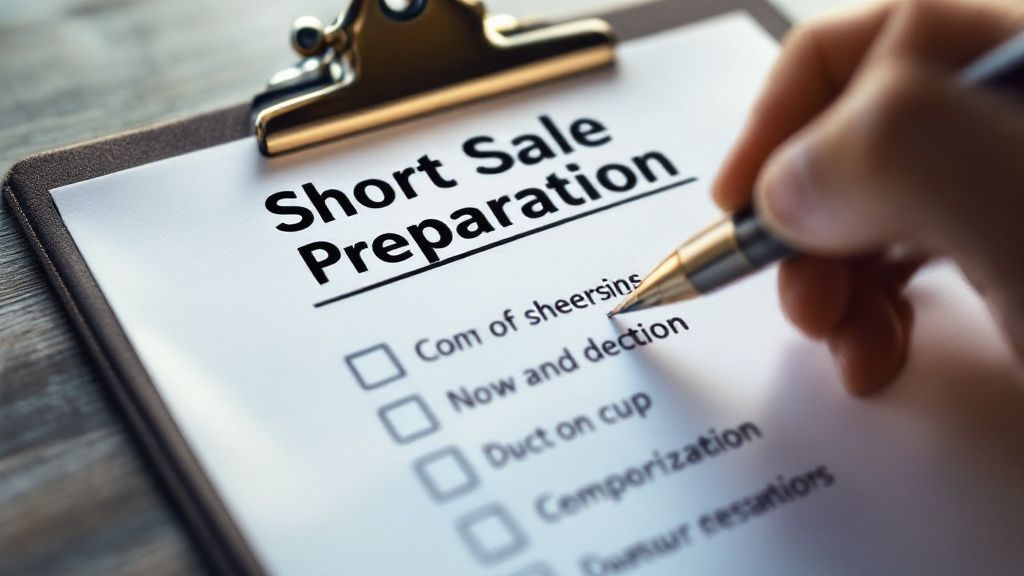Yes, a short sale will negatively impact your credit score. The process of foreclosure produces more enduring and severe damage to credit scores than short sales. The financial event stands as a major occurrence yet you can restore your financial stability through consistent money management practices.
You face many choices when financial challenges become too much to handle. This guide explains how short sales affect your credit score and compares them to other options while providing methods to restore your financial situation.
The Short Answer on Short Sales and Your Credit

The first thing you need to know when you face mortgage payment problems is whether a short sale will affect your credit score. The credit damage from a short sale remains present despite being less severe than the damage from foreclosure.
Here’s why:your lender reports the short sale to the credit bureaus as a “settlement.”This means you didn’t pay the full amount you originally agreed to, which is a red flag for future lenders.
Your credit score will experience an immediate drop. Your FICO score will decline by about 100 to 150 points according to average estimates. The exact number depends on your credit health beforehand; someone with a stellar 800 score might see a steeper drop than someone with a 650 score.
Short Sale Credit Impact At a Glance
To give you a clearer picture, here’s a quick breakdown of how a short sale typically shows up on your financial record.
| Financial Factor | Typical Impact of a Short Sale |
|---|---|
| Credit Score Drop | Your credit score will experience a decline that tends to fall between 100 and 150 points. |
| Credit Report Notation | Shows as “settled for less than full balance” or similar language. |
| Public Record | A short sale is not a public record, unlike a foreclosure. |
| Future Mortgages | You may be able to get a new mortgage in as little as 2 years. |
| Other Loans | The initial application process for auto loans and credit cards becomes more difficult when you have this issue. |
The table shows that active treatment produces fast improvements which continue for a shorter period compared to other treatment methods.
The process of handling this situation becomes more difficult when there is a limited amount of time to complete it. Before committing to a short sale, it’s wise to explore all avenues.You could discuss loan modification or forbearance options with your lender. Homeowners who need quick and clean sales should think about direct cash sales as their best option. The system bypasses the extended bank negotiation period of a short sale while it provides an exact completion date. If you’re running out of time, you might want to learn more about how to stop a foreclosure auction immediately.
How a Short Sale Hits Your FICO Score
The lender will submit your short sale information to credit bureaus which will create a permanent negative mark on your credit report. Your credit report will display an entry that states “settled for less than the full debt amount” or “paid settled.”
Your credit history functions as your financial reputation. A late payment is a minor ding, but a short sale is a much bigger deal.The information will warn future lenders that you failed to follow your mortgage contract terms which creates a dangerous situation for them.
The Math Behind the Score Drop
So, how much damage are we talking about?People tend to have different definitions of what constitutes substantial credit damage. The impact of a short sale depends almost entirely on where your credit stood before things went south.
FICO data shows that short sales result in credit score drops which range from 50 to 160 points. The exact amount of score reduction depends on your current credit score because higher scores have more points to lose. You can dig deeper into how this works in these helpful reports from Experian.
The biggest hit to your score often isn’t the short sale itself.Your credit score would drop because of the missed mortgage payments that took place right before the default.Each 30, 60, or 90-day delinquency does its own damage long before the final settlement.
It’s More Than Just One Number
The number of delinquencies you rack up beforehand really matters.A person who misses two or fewer payments before completing a short sale will have better financial stability than someone who has missed six or more payments. Multiple missed payments create a worsening situation which shows extended financial difficulties.
It’s crucial to see the big picture here.The mortgage default process produces various effects which you must understand to determine your following actions. Your present financial decisions will create the path which leads to your future financial recovery.
Short Sale vs. Foreclosure: The Credit Consequences
The decision between short sale and foreclosure becomes a battle between two terrible options when financial difficulties strike. Let’s be clear: both will take a toll on your credit.The financial consequences of these events produce distinct effects which remain active for different durations.
A foreclosure is what happens when the bank takes over.Your credit report shows an unintentional event which produces deep damage to your credit history. The credit score drop could reach 250 points or maybe even more. That kind of damage sticks around for seven long years, making it incredibly tough to get approved for new credit, let alone another mortgage.
A short sale, on the other hand, puts you back in the driver’s seat.A person who takes active steps to enhance their life situation demonstrates proactive behavior. The impact on your credit score will remain but the severity reduces to about 100 to 150 points. You demonstrate your lender that you are working to pay off your debt by selling the home which creates a better impression than abandoning the property without notice.
The two methods present various challenges but the short sale process tends to create less harm to your financial situation.

Comparing The Long-Term Impact
Your credit score drop creates an initial difference but you must analyze the recovery process to understand the true distinction. The time has come to decide but you need to evaluate all your options before deciding on foreclosure. Your ability to recover swiftly contains the actual narrative.
The table provides an exact comparison of all financial effects.
Short Sale vs. Foreclosure Financial Impact
| Factor | Short Sale | Foreclosure |
|---|---|---|
| Credit Score Impact | Typically drops 100-150 points. | Can drop 250+ points. |
| Time on Credit Report | Stays on for 7 years. | Stays on for 7 years. |
| Future Mortgage | May qualify in as little as 2 years. | Waiting period can be 5-7 years. |
| Lender Perception | Seen as cooperative problem-solving. | Viewed as an involuntary default. |
The numbers really tell the story.Your credit report will show both events for seven years but short sales allow you to qualify for new mortgages faster than foreclosures do. Your lenders will view this as you assuming debt responsibility which creates a huge difference in how they perceive your situation.
Exploring Your Options Before a Short Sale
You need to understand that a short sale does not represent your only path before you begin the process. Financial problems can create a sense of entrapment yet multiple options exist to escape this situation. Short sale prevention programs help you avoid the need for a short sale which would harm your credit score.
Reviewing all your choices enables you to take control of your situation again. The solution which suits you most depends on your present circumstances and your financial institution’s flexibility and your future plans.
Working Directly With Your Lender
The first thing you must do is establish a direct connection with your mortgage lender. Most lenders would rather find a solution with you than go through the expensive hassle of a foreclosure.
-
The process of loan modification requires changing your mortgage terms to create more affordable payment amounts. Your interest rate may decrease and your loan term could get longer and some lenders might lower your principal debt amount.
-
Forbearance Agreement: This is a temporary pause.Your lender agrees to let you make smaller payments—or no payments at all—for a set period.The program works well for people who need temporary financial help because they lost their job recently.
-
Deed in Lieu of Foreclosure: With this arrangement, you voluntarily give the property title back to the bank.The lender will erase your mortgage debt so you can avoid having a foreclosure mark on your credit history.
Reviewing these options shows the lender that you want to solve the issue instead of trying to avoid it. The proactive approach tends to receive better acknowledgment from lenders.
An Alternative for Speed and Certainty: A Cash Sale
Sometimes, the simplest and quickest path forward is the best one.If negotiating with the bank feels like a dead end or you need to resolve your situation quickly, selling your house for cash is a powerful alternative.The process enables you to skip the extended wait period which comes with traditional short sales and conventional home sales.
A cash sale can often be completed in a matter of weeks, not months.The system works quickly to stop missed payments from occurring which protects your credit score from damage. The process serves as a direct solution for property owners to prevent foreclosure while receiving cash payments to start fresh.
If this route sounds like it might fit your needs, a company like Eagle Quick For Cash can provide a fair cash offer to help you move forward quickly.The service provides an easy solution which offers users comfort through its operation.
Your Path to Credit Recovery After a Short Sale

Your credit score will recover from the short sale when the process ends but you must start rebuilding it. Your credit score shows damage now but the impact will fade with time.
Think of your credit score less like a final grade and more like a real-time snapshot of your financial health—one you can actively improve.Your first step requires you to start building fresh positive credit history immediately.
Your main goal now is to prove to lenders that you’re a reliable borrower.The short sale was only a single financial event in your complete credit history. The best way to do this is by paying every single bill on time, every single time.The simple action of making payments on time shows creditors that your financial situation is back to normal.
Rebuilding with Strategic Credit Tools
Your financial recovery becomes possible through strategic credit usage. The way I see it you need to prove that you handle credit well even though it seems wrong. The current situation makes it challenging to obtain a regular credit card so you should seek alternative solutions. You have multiple options.
-
Secured Credit Cards:These are the perfect entry point for beginners.Your credit limit equals the amount you deposited which usually starts at $200. Your monthly payments need to cover all your purchases from gas stations and grocery stores. The activity gets reported to the credit bureaus which helps you improve your credit score.
-
Credit-Builder Loans:These are designed specifically for this purpose.The money will not be given to you at the start of the process.Your payments will consist of little amounts which will be kept in a savings account until the full loan amount gets paid off. Once you’ve paid it off, you get the cash.The account functions as a forced savings system which helps you develop a positive payment history.
-
Authorized User Status: If you have a trusted friend or family member with excellent credit, ask if they’d be willing to add you as an authorized user on one of their cards.Your credit score will improve through the payment history of your friend or family member even when you do not use the card.
Keep in mind, the point isn’t to rack up new debt.The tools help you build a new payment history of on-time payments because this factor has the highest impact on your FICO score.
There are various methods to resolve complex housing issues while you work on your recovery process. Selling your home for cash shows you the advantages of a fast guaranteed sale which provides instant financial relief while avoiding prolonged credit damage. The cash offer stands as an excellent solution because it provides immediate payment without any delays.
Got Questions About Short Sales and Your Credit? Let’s Talk.
The explanation about short sales has become clearer to you yet you probably still have some remaining questions. Your decision holds great importance because it will shape your financial path for the next years. Let’s tackle some of the most common concerns.
Your ability to move forward with confidence depends on obtaining these facts correctly.
How Long Will a Short Sale Haunt My Credit Report?
This is the big one.A short sale will appear on your credit report for up to seven years, but that number can be misleading.Your credit score will experience an initial drop but the impact becomes less severe over time.
The real hit happens right away and in the first couple of years.The negative impact of your short sale will continue to fade away as you build new positive financial habits by paying your bills on time.
Can I Buy a Home Again After a Short Sale?
Yes, you absolutely can.The main advantage of choosing a short sale instead of foreclosure lies in its ability to return you to homeownership more quickly. Your waiting period depends on the loan type you choose and your credit performance after the sale.
Here’s a general timeline you can expect:
- Conventional Loans: You could be back in the market in as little as 2-4 years.
- FHA Loans: Typically, you’ll be looking at a waiting period of about 3 years.
- VA Loans: For veterans, the window can be as short as 2 years.
Will I Still Owe the Bank Money After It’s All Over?
The response to this vital matter requires more than a yes or no answer. The outcome depends on the agreement you reach with your lender together with your state’s legal regulations.
Your lender will grant you a deficiency waiver which serves as an official document that erases the difference between your sale amount and your outstanding mortgage debt. Without this, they could pursue a deficiency judgment to legally collect what you still owe.Always, always get any agreement to waive the deficiency in writing before you close the sale.
Financial difficulties create obstacles yet you must understand every available option. A short sale is one path, but for those who need a quicker, more certain solution, selling your house for cash can be a better alternative.If the uncertainty of a short sale or the damage of a foreclosure isn’t right for you, Eagle Quick For Cash can make a fair, all-cash offer for your house as-is.You could close in as little as two weeks, stop further credit damage, and walk away with cash to start fresh.Find out how we can help.





